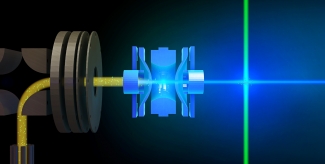Building on the successes of gas phase molecular spectroscopy of small molecules, we are pushing towards ever larger and more complex target systems by using electrospray ionization to prepare complex molecules from solutions. Mass selection allows us to prepare our target species without the influence of any unwanted chemical environment. The use of cryogenic ion traps enables us to add a well-controlled number of solvent molecules and to control the temperature of our target ions. We use spectroscopy from the far-infrared to the near-ultraviolet to probe the vibrational and electronic properties of molecules and clusters. This approach not only yields high-quality experimental results on complex chemical species, it also makes direct comparison with quantum chemical calculations possible, and our experimental results can serve as benchmarks for the quantum chemical treatment of complex molecular species.



 The Physics Frontiers Centers (PFC) program supports university-based centers and institutes where the collective efforts of a larger group of individuals can enable transformational advances in the most promising research areas. The program is designed to foster major breakthroughs at the intellectual frontiers of physics by providing needed resources such as combinations of talents, skills, disciplines, and/or specialized infrastructure, not usually available to individual investigators or small groups, in an environment in which the collective efforts of the larger group can be shown to be seminal to promoting significant progress in the science and the education of students. PFCs also include creative, substantive activities aimed at enhancing education, broadening participation of traditionally underrepresented groups, and outreach to the scientific community and general public.
The Physics Frontiers Centers (PFC) program supports university-based centers and institutes where the collective efforts of a larger group of individuals can enable transformational advances in the most promising research areas. The program is designed to foster major breakthroughs at the intellectual frontiers of physics by providing needed resources such as combinations of talents, skills, disciplines, and/or specialized infrastructure, not usually available to individual investigators or small groups, in an environment in which the collective efforts of the larger group can be shown to be seminal to promoting significant progress in the science and the education of students. PFCs also include creative, substantive activities aimed at enhancing education, broadening participation of traditionally underrepresented groups, and outreach to the scientific community and general public.